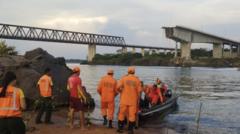Initial reports indicate that the bridge disaster involved the descent of eight vehicles into the water, among which were three lorries loaded with thousands of litres of pesticides and sulphuric acid. Local authorities are scrambling to assess the environmental impact, with diving rescue operations being curtailed until further evaluations can be conducted. Video footage from local councillor Elias Junior, who had previously documented the bridge's deterioration, captured the moment of the collapse, leaving him horrified and in disbelief.
Due to the potential risk posed by chemicals contaminating the water supply, residents of the nearby towns of Estreito and Aguiarnopolis have been advised against collecting water from the river. Rescue teams are actively searching for survivors and have successfully recovered four bodies, including a young girl. The bridge in question, the Juscelino Kubitschek de Oliveira, spans over 1,600 feet and serves as a vital transit route, having been constructed in the 1960s.
As emergency measures continue, local and federal officials face the dual challenge of managing the immediate search and rescue operations while also addressing the looming environmental threat from the leaked substances.
Due to the potential risk posed by chemicals contaminating the water supply, residents of the nearby towns of Estreito and Aguiarnopolis have been advised against collecting water from the river. Rescue teams are actively searching for survivors and have successfully recovered four bodies, including a young girl. The bridge in question, the Juscelino Kubitschek de Oliveira, spans over 1,600 feet and serves as a vital transit route, having been constructed in the 1960s.
As emergency measures continue, local and federal officials face the dual challenge of managing the immediate search and rescue operations while also addressing the looming environmental threat from the leaked substances.
















